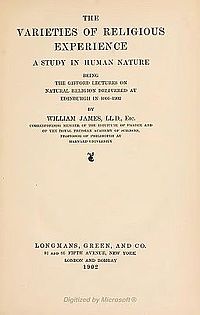
The Varieties of Religious Experience
The Varieties of Religious Experience: A Study in Human Nature is a book by Harvard University psychologist and philosopher William James. It comprises his edited Gifford Lectures on natural theology, which were delivered at the University of Edinburgh, Scotland between 1901 and 1902. The lectures concerned the psychological study of individual private religious experiences and mysticism, and used a range of examples to identify commonalities in religious experiences across traditions.
Soon after its publication, Varieties entered the Western canon of psychology and philosophy and has remained in print for over a century.
James later developed his philosophy of pragmatism. There are many overlapping ideas in Varieties and his 1907 book Pragmatism.[2]
$_$_$DEEZ_NUTS#0__titleDEEZ_NUTS$_$_$
$_$_$DEEZ_NUTS#0__subtitleDEEZ_NUTS$_$_$
$_$_$DEEZ_NUTS#2__titleDEEZ_NUTS$_$_$
$_$_$DEEZ_NUTS#2__descriptionDEEZ_NUTS$_$_$
Historical context[edit]
$_$_$DEEZ_NUTS#6__descriptionDEEZ_NUTS$_$_$
$_$_$DEEZ_NUTS#3__titleDEEZ_NUTS$_$_$
$_$_$DEEZ_NUTS#3__descriptionDEEZ_NUTS$_$_$
Psychology of religion[edit]
In the 1890s, a "new psychology" emerged in European and American universities which coincided with the establishment of many new psychology laboratories and the appointment of faculty in psychology. New psychology's novelty was encapsulated by its distinction from philosophy (philosophy of mind in particular) and theology, and its emphasis on the laboratory-based experimental method. As part of this development, the psychology of religion emerged as a new approach to studying religious experience, with the US being the major centre of research in this field.[3]
A few years earlier Edwin Diller Starbuck had written a book entitled Psychology of Religion which James had written a preface to. James thanks Starbuck in the preface to his book for having "made over to me his large collection of manuscript material" before then citing Starbucks work throughout The Varieties.[4][5] Starbuck recollects that James looked through "several hundred" of his documents.[6]
The Varieties was first presented in 1901-2 as a set of twenty Gifford lectures at the University of Edinburgh. This was a lecture series instituted by Adam Gifford and intended to have a popular and public audience on the subject of natural theology, or scientific approaches to the study of religion.[7] James had originally planned for the second half of his lectures to be a philosophical assessment of religion but ill health meant that he could only write one lecture on the topic, resulting in a work more descriptive than James had initially anticipated.[8]
Themes[edit]
Religious experiences[edit]
In the Varieties, James explicitly excludes from his study both theology and religious institutions, choosing to limit his study to direct and immediate religious experiences, which he regarded as the more interesting object of study.[9] Churches, theologies, and institutions are important as vehicles for passing on insights gained by religious experience but, in James's view, they live second-hand off the original experience of the founder.[10] A key distinction in James's treatment of religion is between that of healthy-minded religion and religion of the sick soul; the former is a religion of life's goodness, while the latter cannot overcome the sense of evil in the world.[9] Although James presents this as a value-neutral distinction between different kinds of religious attitudes, he, in fact, regarded the sick-souled religious experience as preferable, and his anonymous source of melancholy experience in lectures VI and VII is, in fact, autobiographical.[11] Following these autobiographical sections, James transitions into two lectures (IX and X) examining religious conversion from a psychological point-of-view, along with its importance in religious history. James considered healthy-mindedness to be America's main contribution to religion, which he saw running from the transcendentalists Ralph Waldo Emerson and Walt Whitman to Mary Baker Eddy's Christian Science. At the extreme, the "healthy-minded" see sickness and evil as an illusion. James considered belief in the "mind cure" to be reasonable when compared to medicine as practiced at the beginning of the twentieth century.[12]
James devotes two lectures to mysticism, and in the lectures, he outlines four markers common to mystical experiences. These are:
$_$_$DEEZ_NUTS#4__titleDEEZ_NUTS$_$_$
$_$_$DEEZ_NUTS#4__descriptionDEEZ_NUTS$_$_$
$_$_$DEEZ_NUTS#4__heading--0DEEZ_NUTS$_$_$
$_$_$DEEZ_NUTS#4__description--0DEEZ_NUTS$_$_$
$_$_$DEEZ_NUTS#8__titleDEEZ_NUTS$_$_$
$_$_$DEEZ_NUTS#8__subtextDEEZ_NUTS$_$_$
$_$_$DEEZ_NUTS#5__titleDEEZ_NUTS$_$_$
$_$_$DEEZ_NUTS#5__subtextDEEZ_NUTS$_$_$
$_$_$DEEZ_NUTS#7__titleDEEZ_NUTS$_$_$
$_$_$DEEZ_NUTS#7__subtextDEEZ_NUTS$_$_$
$_$_$DEEZ_NUTS#1__titleDEEZ_NUTS$_$_$
$_$_$DEEZ_NUTS#1__subtextDEEZ_NUTS$_$_$
$_$_$DEEZ_NUTS#1__answer--0DEEZ_NUTS$_$_$
$_$_$DEEZ_NUTS#1__answer--1DEEZ_NUTS$_$_$
$_$_$DEEZ_NUTS#1__answer--2DEEZ_NUTS$_$_$
$_$_$DEEZ_NUTS#1__answer--3DEEZ_NUTS$_$_$
$_$_$DEEZ_NUTS#1__answer--4DEEZ_NUTS$_$_$
$_$_$DEEZ_NUTS#1__answer--5DEEZ_NUTS$_$_$
$_$_$DEEZ_NUTS#1__answer--6DEEZ_NUTS$_$_$
$_$_$DEEZ_NUTS#1__answer--7DEEZ_NUTS$_$_$
$_$_$DEEZ_NUTS#1__answer--8DEEZ_NUTS$_$_$
$_$_$DEEZ_NUTS#1__answer--9DEEZ_NUTS$_$_$